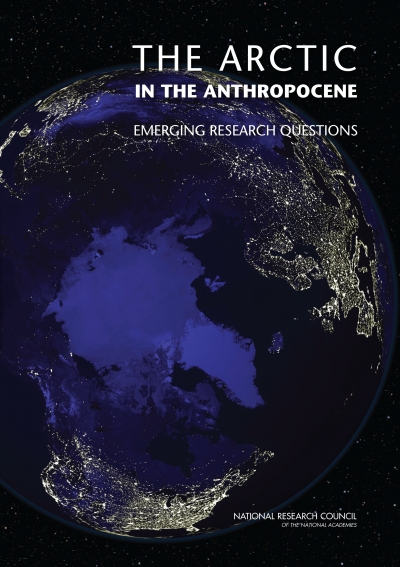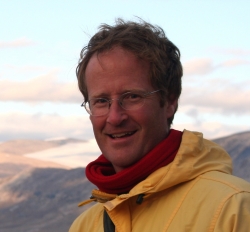By: Lauren Everett, associate program officer with the Polar Research Board and the Board on Atmospheric Sciences and Climate at the National Academy of Sciences

In April 2014, the Polar Research Board (PRB) of the U. S. National Academy of Sciences issued the report, The Arctic in the Anthropocene: Emerging Research Questions, which identifies the key scientific questions that are emerging in different realms of Arctic science and provides guidance on future research questions in the Arctic over the next 10-20 years. Sponsored by the U.S. Arctic Research Commission (USARC), the Department of Energy (DOE), the National Aeronautics and Space Administration (NASA), the National Oceanic and Atmospheric Administration (NOAA), the National Science Foundation (NSF), and the Smithsonian Institution, this report addresses the urgency for understanding the rapidly changing Arctic by connecting the dots among future science opportunities and the infrastructure needed to make best use of them through collaboration and coordination, sustained observations, increased human and operational capacity, actionable and accessible information, and innovative funding approaches.
With rapid change unfolding throughout the Arctic, the need for actionable Arctic science has never been greater. Arctic changes have global implications, and this report identifies emerging research questions important for understanding how environmental and societal transitions will affect the Arctic and the rest of the world. It also assesses what is required to address these questions, and points to the need to translate research findings into practical information that can help guide management and policy decisions.

What happens in the Arctic—to ecosystems, people, and climate—has far-reaching implications for the entire planet. One tenth of the world's fish catch comes from Arctic and sub-Arctic waters; an estimated 13% of the world's remaining oil reserves are in the Arctic; and the region is home to indigenous peoples whose cultures have endured for thousands of years. Arctic processes, including atmospheric and ocean circulation, are essential to the functioning of the entire Earth system. But this important region is changing rapidly, a hallmark of the Anthropocene epoch. Climate change is happening faster in the Arctic than anywhere else on Earth, causing loss of ice and snow, thawing of permafrost, and shifts in ecosystems. At the same time, interest is growing in the Arctic's fossil fuel deposits, minerals, and fisheries. The region's governance systems are evolving as the Arctic's indigenous peoples exercise greater political influence—yet northern populations will face new challenges in years to come as change threatens many traditional practices and food sources. Building the capability to mitigate harmful actions and impacts wherever we can, as well as predict and understand the effects of global climate change, will help us prepare to successfully adapt to changing conditions.
With input from the scientific community, agency personnel, diplomats, and the citizens of the Arctic region, the report's authoring committee identified emerging research questions for study over the next two decades. These questions are those that have arisen as rapid change has pervaded the Arctic system, have not yet received the attention they likely deserve, and/or can only now be addressed given technological or other advances—in other words, the questions that in five or ten years' time we would kick ourselves for not asking now. The report assesses not only what is needed to address today's questions, but also to be ready for those emerging in the future. It underscores the importance of translating research findings into practical information that can help guide management and policy decisions.

The report's authoring committee, co-chaired by Stephanie Pfirman and Henry Huntington, identified emerging research questions that fall under five categories:
- Evolving Arctic. The rapid pace of Arctic change is raising new questions and driving new interactions. The Evolving Arctic focuses on the transition to the "new normal" of reduced ice and snow and the cascade of impacts this will have on systems that depend on frozen ground and water. Arctic societies are also changing rapidly, especially in the political realm as indigenous people achieve greater autonomy in some regions.
- Hidden Arctic. The Hidden Arctic explores what could be found as ice barriers diminish—and what could be forever lost amid rapid change. Many aspects of the Arctic have been unknowable, in large part because ice cover has blocked access and presented a major barrier to research. Loss of sea ice, the retreat of glaciers, and technological advances now allow research in new fields, new geographical areas, and throughout the year. At the same time, rapid change can lead to the loss of sites, features, and phenomena.
- Connected Arctic. The Arctic is connected to the rest of the world by air and water currents, by animal migrations and invasive species, and by societal interactions. Changes occurring in the Arctic do not stay in the Arctic, but affect the rest of the northern hemisphere and beyond. Climatic and meteorological connections in particular have far-reaching implications globally; for example, through rising sea level due to mass loss of the Greenland Ice Sheet, and through weather patterns potentially affected by sea ice loss. Outside pressures influence Arctic residents and the experiences of Arctic cultures can inform and be informed by those of indigenous peoples elsewhere.
- Managed Arctic. Questions of societal changes, conflict and cooperation, and proactive vs. reactive decision making are raised in the Managed Arctic. Humans have lived in the Arctic for millennia, shaping their surroundings and making use of what the Arctic has to offer. In recent decades, the human environment has shifted greatly, including political and economic integration with nation-states and less obvious trends such as the urbanization of Arctic peoples. Looking forward, human activity and interventions are likely to increase in frequency, magnitude, and scale in the Arctic. Research is essential to understand the drivers of change, their implications, and options for response.
- Undetermined Arctic. The Undetermined Arctic addresses how we can be prepared to detect and respond to the unexpected. Leaving room for new ideas and making it possible to identify new research directions when the need arises requires research to better assess new topics, long-term observations to identify changes and surprises without delay, and flexibility in funding to move quickly when a significant event occurs.
The committee suggests a number of strategies to help meet these challenges:
- Enhancing Cooperation. No single agency, organization, or country can take on all research topics in the Arctic. Some research questions are too broad, or involve such extensive field efforts that they cannot be resolved solely by researchers from a single country, or supported by a single funding source. In some cases comprehensive data sets of numerous field processes must be collected simultaneously in coordinated expeditions or cruises requiring collaboration among many nations. Cooperation is essential: among researchers, between agencies, among nations, across disciplines, between Arctic residents and visiting scientists, and with the private sector.
- Sustaining Long-term Observations. Long-term observational data are essential for detecting change and for putting research findings into context. There are, however, insufficient long-term observation efforts underway and little coordination among those that do exist. Instead, available records are often a collection of ad hoc efforts conducted with different time scales, in different areas, and for different purposes. It is thus difficult to distinguish large-scale patterns from localized ones, or to connect findings in one discipline to those in another.
- Managing and Sharing Information. Data management requirements have often been underfunded, resulting in poor quality metadata, a lack of long-term archiving, or other shortcomings that greatly reduce the utility of data. Our understanding of the Arctic as a system has evolved through the ability to compare data sets from disparate fields and regions in order to see connections and commonalities. But data management is often left to individuals or to separate efforts depending on agency, program, discipline, or other parameters.
- Maintaining and Building Operational Capacity. New technologies allow new approaches to research in many fields. Among the most promising recent developments is a host of autonomous mobile sensors for the ocean and atmosphere that can be deployed relatively easily and inexpensively. At the same time, it is critical that current capabilities are sustained, including ships, satellites, and research stations.
- Growing Human Capacity. Arctic research depends on sufficient human capacity, including scientists trained in the necessary fields who are capable of interdisciplinary collaboration. During the International Polar Year, concerted efforts were made to involve young researchers, and those opportunities help to retain scientists in Arctic research. Additionally, Arctic residents can offer a great deal to research efforts. To avoid "research fatigue" it is important to make sure that Arctic residents have the chance to act on what is learned from research, and to use knowledge gained to enhance the adaptive capacity of their community.
- Investing in Research. Society's ability to address emerging research questions in the Arctic is closely tied to the way research funding is organized. Given the emerging research questions and implementation challenges identified in this report, pressures are growing for support of comprehensive systems and synthesis research, non-steady-state research, social science, stakeholder-initiated research, international research, and long-term observations. Other approaches are used in different countries, and the tradeoffs involved are worth considering to assess whether some of those approaches might be adopted or adapted in the United States.
Getting more from Arctic research may best be pursued by enhancing the ways we make use of that research. To build knowledge and solve problems, collaboration is needed—not just among scientific disciplines, or between scientists and those who live in the Arctic, but also with and between decision makers to better understand what they require and how scientific results are factored with other considerations to produce decision outcomes. Fostering a sense of shared purpose to manage change to the best of our abilities is essential, as is a continued commitment to studying what exists, what is emerging, and what awaits us in the Arctic.
The report is available as a free PDF at: http://www.nap.edu/catalog.php?record_id=18726. To purchase paper copies, please contact the National Academies Press at: 800-624-6242.
The PRB is a unit within the National Academies and is responsible for studies related to the Arctic, Antarctic, and cold regions in general. More information about the PRB and other related activities is available here or contact Lauren Everett (LEverett [at] nas.edu).
